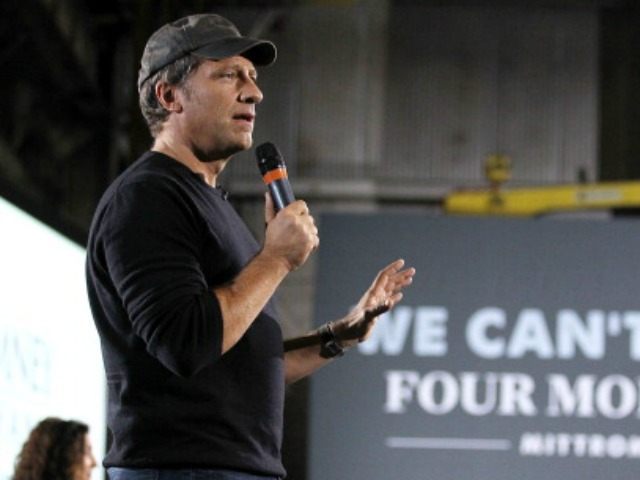CNN host Mike Rowe – the longtime host of a show dedicated to hard and messy work called Dirty Jobs, and a tireless advocate of blue-collar jobs – had an interesting response to the latest burst of politically-correct idiocy from MSNBC.
Rowe is praising hard work, and provides an outstanding explanation for why working hard is not the same thing as slavery. Along the way, he made a cutting observation about the Left’s assault on the American work ethic.
Rowe quotes MSNBC host Melissa Harris-Perry in full:
I want us to be super careful when we use the language “hard worker.” I actually keep an image of folks working in cotton fields on my office wall, because it is a reminder about what hard work really looks like. But in the context of relative privilege, when you talk about work-life balance, the moms who don’t have health care aren’t called hard workers. We call them failures. We call them people who are sucking off the system.
What makes this outburst especially odd is that Harris-Perry was responding to praise for Speaker of the House Paul Ryan’s work ethic. Ryan is widely praised for his energy, but it would seem like a very long and tortured intellectual journey to connect it with involuntary manual labor.
Rowe picked up on Harris-Perry’s talk of “relative privilege,” and pointed out one of the most important distinctions between “hard work” and slavery: the former is voluntary.
First of all, slavery is not “hard work;” it’s forced labor. There’s a big difference. Likewise, slaves are not workers; they are by definition, property. They have no freedom, no hope, and no rights. Yes, they work hard, obviously. But there can be no “work ethic” among slaves, because the slave has no choice in the matter.
Workers on the other hand, have free will. They are free to work as hard as they wish. Or not. The choice is theirs. And their decision to work hard, or not, is not a function of compliance or coercion; it’s a reflection of character and ambition.
This business of conflating hard work with forced labor not only minimizes the importance of a decent work ethic, it diminishes the unspeakable horror of slavery. Unfortunately, people do this all the time. We routinely describe bosses as “slave-drivers,” and paychecks as “slave’s wages.” Melissa though, has come at it from the other side. She’s suggesting that because certain “hard workers” are not as prosperous as other “hard workers,” – like the people on her office wall – we should all be “super-careful” about overly-praising hard work.
I suspect this is because Melissa believes – as do many others – that success today is mostly a function of what she calls, “relative privilege.” This is fancy talk for the simple fact that life is unfair, and some people are born with more advantages than others. It’s also a fine way to prepare the unsuspecting viewer for the extraordinary suggestion that slavery is proof-positive that hard work doesn’t pay off.
Rowe makes some terrific points in the brief space of his blog post, and skirts along the beaches of a very deep, dark ocean of collectivist thought. Many on the Left argue that all work is essentially involuntary. They see the vital mission of socialist government as a crusade to free people from need. Need forces people to work at jobs they find unpleasant or unsatisfying. It forces them to put up with demeaning treatment from those who sign their paychecks.
Remember how Democrats tried to spin the wave of unemployment prompted by ObamaCare as a wonderful example of people being “freed” from “job lock?” Remember how House Minority Leader Nancy Pelosi celebrated ObamaCare because it would set people free to pursue lives as poorly-compensated artists and poets, without having to worry about paying for health care?
As a centuries-old strain of collectivist thought puts it, the necessity of working for sustenance forces the Little People to be inauthentic. They are enslaved by their need for food and shelter, forced to hide their true identity and honest thoughts for the sake of earning a paycheck, and getting along with the arrogant jerks who sign it.
Unsurprisingly, this line of thinking is an easy sell to young people, and immature people who are no longer young.
Another common strain of Leftist thought involves changing the definition of “work.” It is very common to hear the labor of upper-income people dismissed as cream-puff activity, compensated at outrageously high rates, even though it’s nowhere near as difficult as the labors of the working poor. Phrases such as “working families” were coined to separate lower- and middle-income people from the high wage earners they’re supposed to despise, so they’ll withhold any moral objection to seizing the “unfair” wealth of those tax revenue targets. Even high-income people who work insanely long hours are treated as overpaid under this philosophy.
Notice how Harris-Perry cites “moms who don’t have health care” as her example of true, but unsung, “hard workers.” This appropriates the language of productive labor for other political ends. Lacking health care may be lamentable, but it has nothing to do with working hard. (Also, why are moms lacking health care, after President Obama nationalized health insurance?)
The Left has been pushing the notion that no one should have to work hard for a long time. It wants the acclaim and respect for hard work bestowed on their preferred constituencies, but in the end they think work should be optional. Encouraged, perhaps – but the socialist welfare state is explicitly premised on the notion that it’s cruel to force people to work for their basic necessities of food and shelter. Rowe might be surprised at how many people would strenuously argue with his contention that hard work is fundamentally different from slavery.

COMMENTS
Please let us know if you're having issues with commenting.